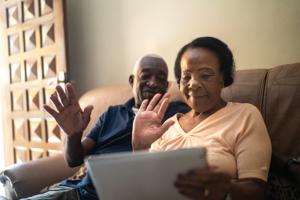 The isolation and fear caused by COVID-19 has wreaked havoc on the wellbeing of older adults, with nearly half of seniors surveyed in a Kaiser Family Foundation poll stating that their amount of stress and worry was negatively impacting their health. And while it still may be unsafe to visit in person with older adults, it’s crucial to stay in regular and frequent contact, and to watch out for any changes or signs which might indicate a mental health concern.
The isolation and fear caused by COVID-19 has wreaked havoc on the wellbeing of older adults, with nearly half of seniors surveyed in a Kaiser Family Foundation poll stating that their amount of stress and worry was negatively impacting their health. And while it still may be unsafe to visit in person with older adults, it’s crucial to stay in regular and frequent contact, and to watch out for any changes or signs which might indicate a mental health concern.
As stated by psychiatrist Judith Feld, MD, MPH, “If a senior usually really enjoys a call with a grandchild, for example, but that seems to have changed, maybe you need to ask more questions, such as, ‘How can we be of help?’”
Other symptoms and signs of depression to watch for include sleeping issues, reduced appetite, sluggishness, and complaints about pain, which interestingly, can often be one of the key symptoms of depression in older adults. Take note of anything that is out of normal for a senior’s personality and character.
It is crucial to understand that depression is not just an unavoidable element of growing older, and that it can be a serious – but treatable – condition.
Here are a few further guidelines to help thoroughly assess an older adult’s mental health:
- Make sure the conversation is natural and organic, without coming across as interrogating. Statements such as, “Tell me what has been happening in your life this week,” will motivate a senior to open up a lot more than, “Tell me what your doctor mentioned at your last scheduled appointment.” The goal is to be caring however, not condescending, being careful never to try to parent your mother and father.
- While talking with and seeing the grandchildren on Zoom is an easy way to boost a senior’s mood, make sure to plan for some one-on-one time to talk, sans children.
- Take notice of what is going on in the background of your video chats for any additional clues, such as whether or not the home looks clean and well maintained, including personal hygiene – unkempt, disheveled hair, for example.
- Take into consideration whether substance abuse might be a factor. An increase in alcohol consumption during the pandemic is happening in individuals of all ages, and can be very harmful if there are potential interactions with medications a senior loved one is taking.
If you suspect depression or any other mental health issues in your senior loved one, be sure to get in touch with the doctor right away. Because you are most familiar with the senior, you may be in a position to pick up on signs that the medical team misses during routine appointments, and it’s vital to help make your concerns known.
If you have any concerns, connect with the St. Petersburg home care experts, Generations at Home, for additional assistance. We’re able to serve as your eyes and ears when you are unable to be there in person, and offer a wide selection of customized services to boost socialization and quality of life at home. Reach out to us at 727-940-3414 to find out more.







